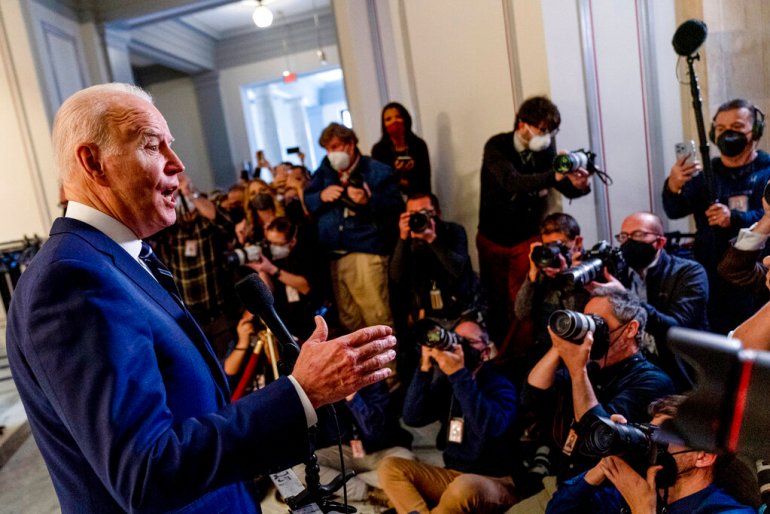US Senate sinks Biden’s major push to protect voting rights | Politics News
Two conservative Democrats voted with all 50 Republicans to block change in rules thereby blocking passage of White House initiatives.
US senators have scuppered President Joe Biden’s push to defend voting rights against what Democrats have framed as an all-out assault by conservative states targeting racial minorities.
Faced with a blockade from Republicans in the upper house complaining of overreach by the federal government, the ruling Democrats were unable to push through the Freedom to Vote Act and John Lewis Voting Rights Advancement Act that were passed last week by the House of Representatives.
“I am profoundly disappointed that the Senate has failed to stand up for our democracy. I am disappointed – but I am not deterred,” Biden said in a statement posted to social media immediately after the vote.
“We will continue to advance necessary legislation and push for Senate procedural changes that will protect the fundamental right to vote.”
Senate Republicans used the decades-old “filibuster” rule to sink the two pieces of legislation, which required the cooperation of at least 60 of the Senate’s 100 members to proceed. The Senate currently is split 50-50.
In lightning speed, Senate Majority Leader Chuck Schumer, a Democrat, then moved to revamp the filibuster rule by lowering the 60-vote threshold to 50. This time, it was not Republicans, but Schumer’s own Democrats – conservatives Joe Manchin and Kyrsten Sinema – who voted against the rule change dooming the legislation.
I am profoundly disappointed that the Senate has failed to stand up for our democracy. I am disappointed — but I am not deterred.
We will continue to advance necessary legislation and push for Senate procedural changes that will protect the fundamental right to vote.
— President Biden (@POTUS) January 20, 2022
Democrats and voting rights activists have championed the measures as a necessary response to Republican efforts to restrict voting, especially among Black and Latino Americans.
“I know this is not 1965. That’s what makes me so outraged. It’s 2022, and they’re blatantly removing more polling places from the counties where Blacks and Latinos are overrepresented,” New Jersey Democrat Cory Booker said on the floor of the Senate.
“I’m not making that up. That is a fact.”
Republican-backed voting restrictions
Republican-controlled states spent the last year leveraging ex-president Donald Trump’s false claims of widespread election fraud to introduce regulations that make voting more difficult.
The legislation would have guaranteed the right to postal voting, ballot drop boxes and at least two weeks of early voting – as well as making Election Day a national holiday.
It also addressed “gerrymandering” – redrawing an electoral district in favour of the ruling party – and would have required states with a history of discrimination to get federal clearance before changing election law.
But all 50 Republicans voted against the reforms, claiming that restrictions such as limiting postal voting and insisting on voter identification were simply common sense.
 President Joe Biden speaks to the media as he leaves a meeting with the Senate Democratic Caucus to discuss voting rights legislation, which failed to get approval on Wednesday [Andrew Harnik/AP]
President Joe Biden speaks to the media as he leaves a meeting with the Senate Democratic Caucus to discuss voting rights legislation, which failed to get approval on Wednesday [Andrew Harnik/AP]“The concern is misplaced. If you look at the statistics, African American voters are voting in just as high percentage as America,” Senate Republican Leader Mitch McConnell told reporters ahead of the vote.
Democrats hold a technical majority of one in the evenly split Senate, with Vice President Kamala Harris able to act as a tiebreaker on 50-50 votes.
In a statement following the vote, Democratic Senator Amy Klobuchar said in a statement: “If history has shown us anything, it is that the fight for voting rights is never over. We cannot and will not give up.”
With the broad push to strengthen voting rights now in limbo, Democrats have the option of pursuing a narrower, cross-party effort to safeguard elections.
This would probably include funding to help protect election officials from threats and tightening the process Congress uses to certify presidential elections every four years.
Republican Senator Mitt Romney told reporters a group of senators planned to meet on Friday to discuss launching a bipartisan effort.

Pingback: cam tokens
Pingback: Infographics
Pingback: Sortiment